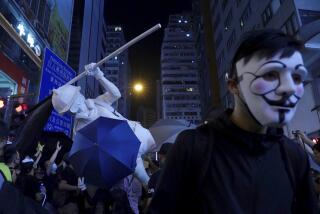The Basics of the Basic Law in Hong Kong
- Share via
Adopted by the National People’s Congress on April 4, 1990, the Basic Law amounts to a promise by the Communist government that it won’t meddle with capitalistic, pluralistic Hong Kong for at least 50 years after taking it over.
The key elements of the thin document (45 pages in the official English-language version) are contained in articles 4 and 5 of the opening chapter.
* Article 4: The Hong Kong Special Administrative Region shall safeguard the rights and freedoms of the residents of the Hong Kong Special Administrative Region and of other persons in the region in accordance with the law.
* Article 5: The socialist system and policies shall not be practiced in the Hong Kong Special Administrative Region and the previous capitalist system and way of life shall remain unchanged for 50 years.
To reassure Hong Kong’s people that their way of life will continue, the Chinese government has hosted rallies to promote the Basic Law. Propaganda officials even composed a catchy pop song to promote the Basic Law:
*
Wo-Wo-Wo
Yea-Yea
With mutual trust there is justice
This is the Basic Law.
Believe it! Rely on it!
*
But there is also widespread skepticism in the Hong Kong population that the Basic Law--based on the seemingly contradictory principle of “one country, two systems”--will do what it promises.
Critics note that the power to interpret and even amend the Basic Law rests with the largely rubber-stamp National People’s Congress in Beijing. True, they say, the Basic Law does guarantee freedoms and rights found in Western parliamentary democracies. But the Constitution of the People’s Republic of China (Article 35) also states that: “Citizens of the People’s Republic of China enjoy freedom of speech, of the press, of assembly, of association, of procession and of demonstration.”
And few believe that these guarantees are honored on the mainland.
The contradiction in China’s principle and practice produced a local Cantonese ditty, recorded by Hong Kong historian/journalist Robert Cottrell, that compared the post-1997 fate of those with foreign passports to those forced to remain behind:
Those with cash
Can always dash;
And for the poor,
There’s the Basic Law.
More to Read
Sign up for Essential California
The most important California stories and recommendations in your inbox every morning.
You may occasionally receive promotional content from the Los Angeles Times.













